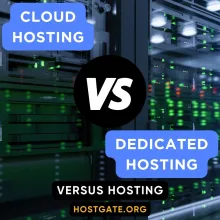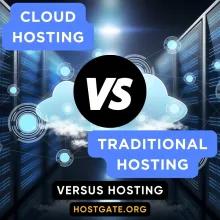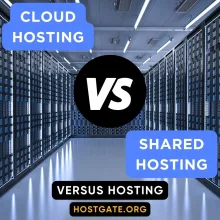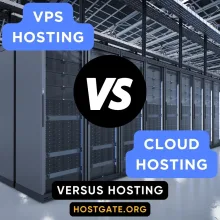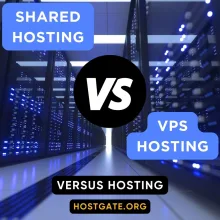VPS Hosting vs Dedicated Hosting – Which One is Better? | HostingVS
VPS and dedicated hosting represent two distinct approaches to web hosting, each offering unique advantages for different business needs. VPS hosting virtualizes a physical server into multiple independent instances, providing a cost-effective solution with good scalability and performance for medium-sized businesses and websites with moderate traffic. Starting at $20-$100 monthly, it offers flexible resource allocation and easier management.
Dedicated hosting, starting at $100-$500+ monthly, provides exclusive access to an entire physical server, delivering maximum performance, security, and customization options, making it ideal for large enterprises, high-traffic websites, and applications requiring specific hardware configurations. While VPS hosting excels in scalability and cost-effectiveness, dedicated hosting offers superior performance and security through complete physical isolation. The choice between the two depends on factors including business requirements, technical expertise, budget constraints, and future growth projections.

 Experience the Most Affordable and Reliable Cloud Web Hosting Cloud Web Hosting Starting at Just $3.99/month! - Unlimited Storage & Traffic - Free Domain Included - 24/7 Expert Support - Dedecated & VPS Hosting Plans |
VPS Hosting vs Dedicated Hosting | VPS Hosting | Dedicated Hosting |
Infrastructure and Resource Access | Operates as a virtual instance within a physical server, sharing the underlying hardware with other virtual servers but with guaranteed allocated resources | Provides exclusive access to an entire physical server with all its resources, with no sharing involved |
Performance and Resource Management | Offers predictable performance within allocated limits but has some overhead due to virtualization | Provides maximum performance potential with direct hardware access and no virtualization overhead, though unused resources may be wasted |
Scalability and Flexibility | Excellent scalability with quick resource adjustments and minimal downtime through the virtualization layer | More rigid scaling requiring physical hardware modifications or migrations, but offers unmatched hardware and software configuration flexibility |
Security and Isolation | Relies on hypervisor technology for virtual isolation between instances, which is highly effective but presents theoretical vulnerability points | Offers the highest level of security through complete physical separation, making it ideal for handling sensitive data and meeting strict compliance requirements |
Cost Structure | More economical with monthly costs ranging from $20 to $100, offering a lower entry point | Significantly higher pricing starting from $100 to $500+ monthly, reflecting the exclusive hardware access |
VPS Hosting vs Dedicated Hosting: Key Differences Explained
In today’s digital landscape, choosing the right hosting solution is crucial for business success. Virtual Private Server (VPS) hosting and dedicated hosting represent two distinct approaches to web hosting, each with unique characteristics and benefits. VPS hosting divides a physical server into multiple virtual instances, each operating independently, while dedicated hosting provides exclusive access to an entire physical server. This fundamental difference shapes their performance, cost, and use cases.
Performance and Resource Allocation
VPS hosting offers predictable performance within allocated resources, as each virtual instance receives a guaranteed portion of the server’s CPU, memory, and storage. However, the virtualization layer can introduce minimal overhead. In contrast, dedicated hosting provides maximum performance potential with direct access to all server resources. There’s no resource sharing or virtualization overhead, making it ideal for high-performance applications. The downside of dedicated hosting is that unused resources cannot be allocated elsewhere, potentially leading to waste if not properly utilized.
Cost Considerations and Value Proposition
When comparing costs, VPS hosting typically presents a more economical entry point, with prices ranging from $20 to $100 monthly, depending on resources. Dedicated servers command higher prices, often starting at $100 and reaching $500+ monthly, reflecting the exclusive hardware access and enhanced performance capabilities. While VPS offers better initial value, dedicated hosting can be more cost-effective for resource-intensive applications that would otherwise require multiple VPS instances.
Security and Isolation
Both hosting types offer robust security features, but their approaches differ. VPS environments rely on hypervisor technology for isolation, creating secure boundaries between virtual instances. While highly effective, this virtual isolation theoretically presents more potential vulnerability points than dedicated hosting’s physical isolation. Dedicated servers provide the highest level of security through complete physical separation, making them preferred for handling sensitive data or meeting strict compliance requirements.
Scalability and Flexibility
VPS hosting excels in scalability, allowing quick resource adjustments through the virtualization layer. Resources can be added or reduced with minimal downtime, offering excellent flexibility for growing businesses. Dedicated hosting, while powerful, has more rigid scaling limitations. Hardware upgrades often require physical server modifications or migrations, potentially causing longer downtimes. However, dedicated hosting provides unmatched flexibility in hardware and software configurations.
Management and Maintenance
Both hosting types offer managed and unmanaged options, but their maintenance requirements differ significantly. VPS hosting generally requires less technical expertise, as the provider handles the underlying hardware maintenance. However, users must still manage their virtual environment. Dedicated hosting demands more technical knowledge for effective management, including hardware maintenance in unmanaged solutions. The upside is complete control over the entire server environment.
Ideal Use Cases
VPS hosting suits medium-sized businesses, development environments, and websites with moderate traffic. It provides a good balance of performance and cost-effectiveness. Dedicated hosting is optimal for large enterprises, high-traffic websites, and applications requiring maximum performance or specific hardware configurations. E-commerce sites handling sensitive payment data, gaming servers, and big data applications often benefit from dedicated hosting’s superior performance and security.
Technical Configurations
VPS environments support most common operating systems and software configurations within the virtualization constraints. While customization options are extensive, some low-level hardware configurations may be restricted. Dedicated servers offer unlimited configuration possibilities, including custom hardware specifications, kernel-level modifications, and specialized software implementations. This flexibility comes with the responsibility of managing complex configurations.
Performance Monitoring and Support
Both hosting types provide comprehensive monitoring tools, but dedicated hosting offers more detailed hardware-level insights. VPS users can monitor their allocated resources and performance metrics, while dedicated hosting users can access complete server statistics and hardware monitoring. Support levels vary by provider but generally include basic infrastructure support for VPS and more comprehensive support options for dedicated hosting.
Long-term Considerations
When choosing between VPS and dedicated hosting, consider future growth projections. VPS hosting offers easier vertical scaling but may require migration to dedicated hosting as needs grow. Dedicated hosting provides a stable, high-performance platform but requires careful capacity planning to avoid underutilization. Both solutions support business continuity through backup and disaster recovery options, though implementation methods differ.
Emerging Trends and Future Outlook
The hosting industry continues to evolve, with improvements in virtualization technology narrowing the performance gap between VPS and dedicated hosting. Cloud-native technologies and containerization are influencing both hosting types, with VPS hosting particularly benefiting from enhanced resource optimization. Dedicated hosting remains relevant for specific use cases, especially as hardware capabilities advance and specialized computing needs grow.
Making the Right Choice
The decision between VPS and dedicated hosting should align with business requirements, technical expertise, and budget constraints. VPS hosting offers an excellent balance of performance, cost, and scalability for most applications. Dedicated hosting provides maximum performance and control but requires higher investment and technical expertise. Consider starting with VPS hosting and migrating to dedicated hosting when resource demands or security requirements justify the transition.
Summary and FAQs
Which is more cost-effective for a growing business: VPS or dedicated hosting?
I can break down the cost-effectiveness for a growing business:
For most growing businesses, VPS hosting is typically more cost-effective because:
- Lower initial investment ($20-$100/month vs $100-$500+/month for dedicated)
- Flexible resource scaling – you only pay for what you need
- Lower technical overhead since providers handle hardware maintenance
- The ability to quickly adjust resources up or down as your needs change
- No wasted resources since you’re not paying for unused capacity
However, there’s an important inflection point: If your business grows to require multiple VPS instances to handle your workload, dedicated hosting might become more cost-effective. This typically happens when:
- Your application becomes very resource-intensive
- You need to maintain multiple high-powered VPS instances
- You require specific hardware configurations
- Your security requirements demand physical server isolation
The key is to match your current needs while planning for growth. Most growing businesses should:
- Start with VPS hosting
- Monitor resource usage and costs
- Calculate the breakeven point where multiple VPS instances would cost more than a dedicated server
- Consider migration to dedicated hosting only when resource demands clearly justify the higher investment
This approach provides the most efficient use of resources while maintaining room for growth.
How does security compare between VPS and dedicated hosting?
Here’s a clear analysis of the security differences between VPS and dedicated hosting:
Dedicated Hosting Security:
- Provides the highest level of security through complete physical isolation
- No shared hardware means no risk of neighbor contamination
- Full control over hardware-level security configurations
- Best choice for handling sensitive data or meeting strict compliance requirements
- Fewer potential vulnerability points since there’s no virtualization layer
- Ideal for businesses that need to maintain specific security certifications
VPS Security:
- Relies on hypervisor technology to create secure boundaries between virtual instances
- While very effective, the virtualization layer adds an extra potential attack surface
- Security depends partly on the hosting provider’s hypervisor implementation
- Still provides strong isolation between instances, but through software rather than hardware
- More theoretical vulnerability points due to the shared physical hardware
- Generally sufficient for most business applications that don’t handle extremely sensitive data
It’s worth noting that both options can be highly secure when properly configured. The main difference isn’t necessarily in the absolute level of security possible, but rather in:
- The number of potential vulnerability points
- The level of control you have over security measures
- The ease of meeting specific compliance requirements
The right choice depends on your specific security requirements and compliance needs rather than assuming dedicated hosting is always the more secure option.
Can I upgrade my hosting plan easily as my business grows?
Here’s how upgrading works for each hosting type:
VPS Hosting Upgrades:
- Much easier and more flexible scaling
- Resources can be adjusted quickly (CPU, RAM, storage)
- Minimal to no downtime during upgrades
- Can usually be done through a control panel
- No physical hardware changes needed
- Good for businesses with unpredictable growth patterns
Dedicated Hosting Upgrades:
- More complex upgrade process
- Usually requires physical hardware changes
- May involve longer downtime during upgrades
- Might need server migration for major upgrades
- Hardware changes often need scheduling with provider
- Better suited for businesses with predictable, stable requirements
The recommended growth approach is:
- Start with VPS hosting if you’re growing but unsure of exact resource needs
- Use VPS scaling to handle initial growth phases
- Monitor your resource usage and costs
- Consider switching to dedicated hosting only when:
- You consistently need high-level resources
- Your security requirements demand it
- The cost of multiple VPS instances exceeds dedicated server costs
- You need specific hardware configurations
The key advantage of VPS for growing businesses is that you can scale gradually and pay only for what you need, while dedicated hosting requires more planning and typically involves larger upgrade steps.
Which hosting type is better for e-commerce websites?
Here’s a detailed analysis of hosting options for e-commerce websites:
The best choice depends on your e-commerce site’s specific characteristics:
Dedicated Hosting is Better If:
- You handle high transaction volumes
- You store sensitive payment data directly
- Your site has consistently high traffic
- You need guaranteed maximum performance during peak sales
- You must meet strict payment security compliance standards
- You run resource-intensive e-commerce applications
- You have predictable, high-volume traffic patterns
VPS Hosting is Better If:
- You’re just starting your e-commerce business
- You have moderate traffic levels
- Your sales volumes fluctuate seasonally
- You’re using standard e-commerce platforms
- You want to optimize costs while growing
- You need flexibility to handle sales spikes
- You use third-party payment processors for sensitive data
Most e-commerce sites should follow this approach:
- Start with VPS hosting unless you know you’ll have high volume immediately
- Monitor key metrics:
- Server response times
- Resource usage during peak hours
- Transaction processing speeds
- Cart abandonment rates related to performance
Consider upgrading to dedicated hosting when:
- Payment processing is slowing during high traffic
- Security requirements increase with growth
- The cost of multiple VPS instances approaches dedicated server costs
- You need consistent high performance for a large customer base
The key is matching your hosting to your current business stage while ensuring room for growth and maintaining necessary security for e-commerce operations.
Do I need technical expertise to manage either hosting type?
Here’s a breakdown of the technical expertise required for each hosting type:
VPS Hosting Technical Requirements:
- Less technical expertise needed overall
- Provider handles hardware maintenance
- Still need basic knowledge to manage:
- Operating system administration
- Basic server configuration
- Software updates and patches
- Security settings
- Managed VPS options available for those with limited technical skills
Dedicated Hosting Technical Requirements:
- Requires significantly more technical knowledge
- Need expertise in:
- Hardware management
- Server maintenance
- Network configuration
- Security hardening
- Performance optimization
- Operating system administration
- Troubleshooting at all levels
- Unmanaged options require the most expertise
- Even managed options need more technical understanding
Management Options Available:
Unmanaged: You handle everything
- Cheapest option
- Requires most technical expertise
- Full control over environment
- Best for tech-savvy teams
Managed: Provider handles most maintenance
- Higher cost
- Less technical expertise needed
- Provider manages core infrastructure
- Good middle ground for most businesses
Fully Managed: Provider handles almost everything
- Most expensive option
- Minimal technical expertise required
- Provider manages most aspects
- Best for non-technical teams
The key decision point isn’t just about technical ability – it’s about whether your business has the resources and need to maintain a technical team for server management.

